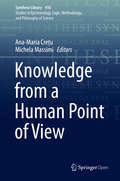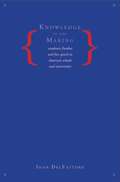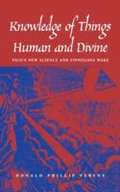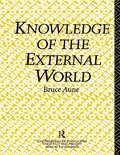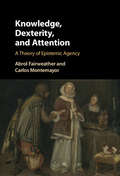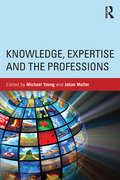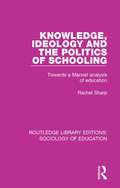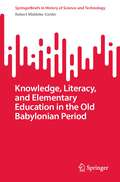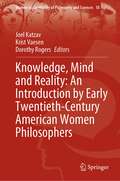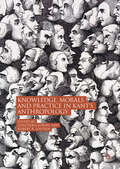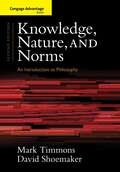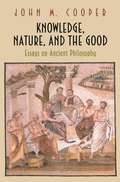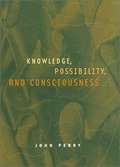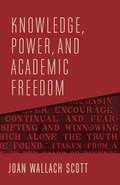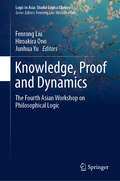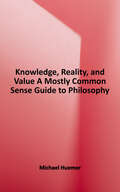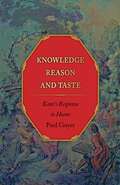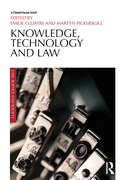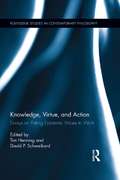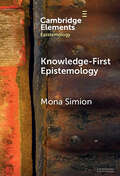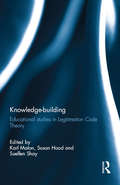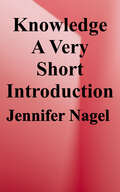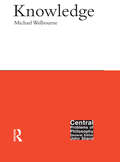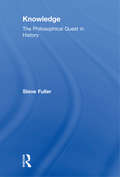- Table View
- List View
Knowledge from a Human Point of View (Synthese Library #416)
by Michela Massimi Ana-Maria CrețuThis open access book – as the title suggests – explores some of the historical roots and epistemological ramifications of perspectivism. Perspectivism has recently emerged in philosophy of science as an interesting new position in the debate between scientific realism and anti-realism. But there is a lot more to perspectivism than discussions in philosophy of science so far have suggested. Perspectivism is a much broader view that emphasizes how our knowledge (in particular our scientific knowledge of nature) is situated; it is always from a human vantage point (as opposed to some Nagelian "view from nowhere"). This edited collection brings together a diverse team of established and early career scholars across a variety of fields (from the history of philosophy to epistemology and philosophy of science). The resulting nine essays trace some of the seminal ideas of perspectivism back to Kant, Nietzsche, the American Pragmatists, and Putnam, while the second part of the book tackles issues concerning the relation between perspectivism, relativism, and standpoint theories, and the implications of perspectivism for epistemological debates about veritism, epistemic normativity and the foundations of human knowledge.
Knowledge in the Making: Academic Freedom and Free Speech in America's Schools and Universities
by Joan DelfattoreHow free are students and teachers to express unpopular ideas in public schools and universities? Not free enough, Joan DelFattore suggests. Wading without hesitation into some of the most contentious issues of our times, she investigates battles over a wide range of topics that have fractured school and university communities--homosexuality-themed children's books, research on race-based intelligence, the teaching of evolution, the regulation of hate speech, and more--and with her usual evenhanded approach offers insights supported by theory and by practical expertise. Two key questions arise: What ideas should schools and universities teach? And what rights do teachers and students have to disagree with those ideas? The answers are not the same for K-12 schools as they are for public universities. But far from drawing a bright line between them, DelFattore suggests that we must consider public education as a whole to determine how--and how successfully--it deals with conflicting views. When expert opinion clashes with popular belief, which should prevail? How much independence should K-12 teachers have? How do we foster the cutting-edge research that makes America a world leader in higher education? What are the free-speech rights of students? This uniquely accessible and balanced discussion deserves the full attention of everyone concerned with academic goals and agendas in our schools.
Knowledge of Things Human and Divine: Vico's New Science and Finnegans Wake
by Donald Phillip VereneThis book takes the reader through the career and works of Giambattista Vico (1668-1744) from a new viewpoint. Two major figures introduced Vico to the twentieth century -- Benedetto Croce and James Joyce. From the mid-twentieth century on there was a growing desire to free Vico from the philosophical idealism of Croce, who in the early part of the century had presented Vico as the Italian Hegel.
Knowledge of the External World (Problems of Philosophy)
by Bruce AuneMany philosophers believe that the traditional problem of our knowledge of the external world was dissolved by Wittgestein and others. They argue that it was not really a problem - just a linguistic `confusion' that did not actually require a solution. Bruce Aune argues that they are wrong. He casts doubt on the generally accepted reasons for putting the problem aside and proposes an entirely new approach. By considering the history of the problem from Descartes to Kant, Aune shows that analogous arguments create difficulties for the contemporary philosophical consensus. He makes it clear that the problem remains acute, particualarly for our understanding of scientific evidence. The solution he proposes draws upon contemporary philosophy of science and probability theory.
Knowledge, Dexterity, and Attention
by Carlos Montemayor Abrol FairweatherContemporary cognitive science clearly tells us that attention is modulated for speech and action. While these forms of goal-directed attention are very well researched in psychology, they have not been sufficiently studied by epistemologists. In this book, Abrol Fairweather and Carlos Montemayor develop and defend a theory of epistemic achievements that requires the manifestation of cognitive agency. They examine empirical work on the psychology of attention and assertion, and use it to ground a normative theory of epistemic achievements and virtues. The resulting study is the first sustained naturalized virtue epistemology, and will be of interest to readers in epistemology, cognitive science, and beyond.
Knowledge, Expertise and the Professions
by Michael Young Johan MullerIt has long been recognised that specialised knowledge is at the core of what distinguishes professions from other occupations. The privileged status of professions in most countries, however, together with their claims to autonomy and access to specialised knowledge, is being increasingly challenged both by market pressures and by new instruments of accountability and regulation. Established and emerging professions are increasingly seen as either the solution, or as sources of conservatism and resistance to change in western economies, and recent developments in professional education draw on a competence model which emphasises what newly qualified members of a profession ‘can do’ rather than what ‘they know’. This book applies the disciplines of the sociology of knowledge and epistemology to the question of professional knowledge. What is this knowledge? It goes beyond traditional debates between ‘knowing how’ and ’knowing that’, and ‘theory’ and ‘practice’. The chapters cover a wide range of issues, from discussions of the threats to the knowledge base of established professions including engineers and architects, to the fraught situations faced by occupations whose fragile knowledge base and professional status is increasingly challenged by new forms of control. While recognising that graduates seeking employment as members of a profession need to show their capabilities, the book argues for reversing the trend that blurs or collapses the skill/knowledge distinction. If professions are to have a future then specialised knowledge is going to be more important than ever before. Knowledge, Expertise and the Professions will be key reading for students, researchers and academics in the fields of professional expertise, further education, higher education, the sociology of education, and the sociology of the professions.
Knowledge, Ideology and the Politics of Schooling: Towards a Marxist analysis of education (Routledge Library Editions: Sociology of Education #50)
by Rachel SharpFirst published in 1980, this book argues that a theory of ideology is essential to a theory of education. It relates developments in the Marxist theory of ideology to the analysis of schooling in a capitalist society. Beginning with an appraisal of the early twentieth century liberal social theorists, including Weber, Durkheim, Veblen and Mannheim, it demonstrates that the weakness of their approaches arose from a failure to comprehend adequately the nature of capitalism. It then outlines the state of the theory of ideology at the time and applies the concept in an analysis of contemporary schooling, concluding with a discussion of its political implications. The application of the theory of ideology offers important possibilities for a radical socialist strategy on education.
Knowledge, Literacy, and Elementary Education in the Old Babylonian Period (SpringerBriefs in History of Science and Technology)
by Robert Middeke-ConlinThis book examines education as a means to explore knowledge and literacy in the Old Babylonian period. It further employs a new method to research these topics. Contrary to numerous existing studies on the subject, the author examines elementary education globally, that is, in pursuit of Old Babylonian education in its entirety. Typically, education is examined in a piecemeal fashion. It's as if education centered on lexicography alone or mathematics alone. This work encompasses a view about educational content and knowledge systems, as opposed to only specific aspects or branches of them. In doing so, a characterization of institution and society is made possible allowing the work to open new general perspectives on Mesopotamian knowledge, literacy, and education.
Knowledge, Mind and Reality: An Introduction by Early Twentieth-Century American Women Philosophers (Women in the History of Philosophy and Sciences #18)
by Joel Katzav Krist Vaesen Dorothy RogersThis book is the first volume featuring the work of American women philosophers in the first half of the twentieth century. It provides selected papers authored by Mary Whiton Calkins, Grace Andrus de Laguna, Grace Neal Dolson, Marjorie Glicksman Grene, Marjorie Silliman Harris, Thelma Zemo Lavine, Marie Collins Swabey, Ellen Bliss Talbot, Dorothy Walsh and Margaret Floy Washburn. The book also provides the historical and philosophical background to their work. The papers focus on the nature of philosophy, knowledge, the philosophy of science, the mind-matter nexus, the nature of time, and the question of freedom and the individual. The material is suitable for scholars, researchers and advanced philosophy students interested in (history of) philosophy; theories of knowledge; philosophy of science; mind, and reality.
Knowledge, Morals and Practice in Kant’s Anthropology
by Robert B. Louden Gualtiero LoriniThis volume sheds new light on Immanuel Kant’s conception of anthropology. Neither a careful and widespread search of the sources nor a merely theoretical speculation about Kant’s critical path can fully reveal the necessarily wider horizon of his anthropology. This only comes to light by overcoming all traditional schemes within Kantian studies, and consequently reconsidering the traditional divisions within Kant’s thought. The goal of this book is to highlight an alternative, yet complementary path followed by Kantian anthropology with regard to transcendental philosophy. The present volume intends to develop this path in order to demonstrate how irreducible it is in what concerns some crucial claims of Kant’s philosophy, such as the critical defense of the unity of reason, the search for a new method in metaphysics and the moral outcome of Kant’s thought.
Knowledge, Nature, And Norms
by David Shoemaker Mark TimmonsFind everything you need for a solid introduction to philosophy with this brief, powerful text. One of the most concise introductory philosophy anthologies available, KNOWLEDGE, NATURE, AND NORMS: AN INTRODUCTION TO PHILOSOPHY, Second Edition features classical philosophy readings, short fiction, and literature from popular writers, as well as a wealth of effective learning tools. Concise, well-edited selections are designed to give first-time philosophy students what you need to succeed--a well-crafted focus on the essential elements of philosophical debate. Integrated learning tools, such as a comprehensive introductory essay at the beginning of the text, provides an overview of how to approach philosophy. Engaging Chapter Introductions highlight key arguments, while Reading Comprehension and Review Questions draw your attention to key ideas. A robust companion website further enhances learning with self-assessment exercises, study guides, and links to philosophical and other helpful resources. With this anthology, you'll find a complete range of philosophical topics, including key issues in epistemology, metaphysics, and ethics. This thorough introduction is all within a book that's one-third the length of a typical anthology for cost savings and unmatched clarity.
Knowledge, Nature, and the Good: Essays on Ancient Philosophy
by John M. CooperKnowledge, Nature, and the Good brings together some of John Cooper's most important works on ancient philosophy. In thirteen chapters that represent an ideal companion to the author's influential Reason and Emotion, Cooper addresses a wide range of topics and periods--from Hippocratic medical theory and Plato's epistemology and moral philosophy, to Aristotle's physics and metaphysics, academic scepticism, and the cosmology, moral psychology, and ethical theory of the ancient Stoics. Almost half of the pieces appear here for the first time or are presented in newly expanded, extensively revised versions. Many stand at the cutting edge of research into ancient ethics and moral psychology. Other chapters, dating from as far back as 1970, are classics of philosophical scholarship on antiquity that continue to play a prominent role in current teaching and scholarship in the field. All of the chapters are distinctive for the way that, whatever the particular topic being pursued, they attempt to understand the ancient philosophers' views in philosophical terms drawn from the ancient philosophical tradition itself (rather than from contemporary philosophy). Through engaging creatively and philosophically with the ancient texts, these essays aim to make ancient philosophical perspectives freshly available to contemporary philosophers and philosophy students, in all their fascinating inventiveness, originality, and deep philosophical merit. This book will be treasured by philosophers, classicists, students of philosophy and classics, those in other disciplines with an interest in ancient philosophy, and anyone who seeks to understand philosophy in philosophical terms.
Knowledge, Possibility, and Consciousness
by John PerryThis book is based on the Nicod lectures given in Lyon and Paris in June 1999. In this book the author takes on each of three major arguments against physicalism, showing that they pose no threat to antecedent physicalism. These arguments are the zombie argument, the knowledge argument, and the modal argument.
Knowledge, Power, and Academic Freedom (The Wellek Library Lectures)
by Joan Wallach ScottAcademic freedom rests on a shared belief that the production of knowledge advances the common good. In an era of education budget cuts, wealthy donors intervening in university decisions, and right-wing groups threatening dissenters, scholars cannot expect that those in power will value their work. Can academic freedom survive in this environment—and must we rearticulate what academic freedom is in order to defend it?This book presents a series of essays by the renowned historian Joan Wallach Scott that explore the history and theory of free inquiry and its value today. Scott considers the contradictions in the concept of academic freedom. She examines the relationship between state power and higher education; the differences between the First Amendment right of free speech and the guarantee of academic freedom; and, in response to recent campus controversies, the politics of civility. The book concludes with an interview conducted by Bill Moyers in which Scott discusses the personal experiences that have informed her views. Academic freedom is an aspiration, Scott holds: its implementation always falls short of its promise, but it is essential as an ideal of ethical practice. Knowledge, Power, and Academic Freedom is both a nuanced reflection on the tensions within a cherished concept and a strong defense of the importance of critical scholarship to safeguard democracy against the anti-intellectualism of figures from Joseph McCarthy to Donald Trump.
Knowledge, Proof and Dynamics: The Fourth Asian Workshop on Philosophical Logic (Logic in Asia: Studia Logica Library)
by Fenrong Liu Hiroakira Ono Junhua YuThis volume gathers selected papers presented at the Fourth Asian Workshop on Philosophical Logic, held in Beijing in October 2018. The contributions cover a wide variety of topics in modal logic (epistemic logic, temporal logic and dynamic logic), proof theory, algebraic logic, game logics, and philosophical foundations of logic. They also reflect the interdisciplinary nature of logic – a subject that has been studied in fields as diverse as philosophy, linguistics, mathematics, computer science and artificial intelligence. More specifically. The book also presents the latest developments in logic both in Asia and beyond.
Knowledge, Reality, and Value: A Mostly Common Sense Guide to Philosophy
by Michael HuemerThe world's best introduction to philosophy, Knowledge, Reality, and Value explains basic philosophical problems in epistemology, metaphysics, and ethics, such as: How can we know about the world outside our minds? Is there a God? Do we have free will? Are there objective values? What distinguishes morally right from morally wrong actions? The text succinctly explains the most important theories and arguments about these things, and it does so a lot less boringly than most books written by professors.
Knowledge, Reason, and Taste: Kant's Response to Hume
by Paul GuyerImmanuel Kant famously said that he was awoken from his "dogmatic slumbers," and led to question the possibility of metaphysics, by David Hume's doubts about causation. Because of this, many philosophers have viewed Hume's influence on Kant as limited to metaphysics. More recently, some philosophers have questioned whether even Kant's metaphysics was really motivated by Hume. In Knowledge, Reason, and Taste, renowned Kant scholar Paul Guyer challenges both of these views. He argues that Kant's entire philosophy--including his moral philosophy, aesthetics, and teleology, as well as his metaphysics--can fruitfully be read as an engagement with Hume. In this book, the first to describe and assess Hume's influence throughout Kant's philosophy, Guyer shows where Kant agrees or disagrees with Hume, and where Kant does or doesn't appear to resolve Hume's doubts. In doing so, Guyer examines the progress both Kant and Hume made on enduring questions about causes, objects, selves, taste, moral principles and motivations, and purpose and design in nature. Finally, Guyer looks at questions Kant and Hume left open to their successors.
Knowledge, Technology and Law (Law, Science and Society)
by Martyn Pickersgill Emilie CloatreThe relationships between knowledge, technologies, and legal processes are central to the constitution of contemporary societies. As such, they have come to provide the focus for a range of academic projects, across interdisciplinary legal studies and the social sciences. The domains of medical law and ethics, intellectual property law, environmental law and criminal law are just some of those within which the pervasive place and ‘impact’ of technoscience is immediately apparent. At the same time, social scientists investigating the making of technology and expertise - in particular, scholars working within the tradition of science and technology studies - frequently interrogate how regulation and legal processes, and the making of knowledge and technologies, are intermingled in complex ways that come to shape and define each other. This book charts the important interface between studies of law, science and society, as explored from the perspectives of socio-legal studies and the increasingly influential field of science and technology studies. It brings together scholars from both areas to interrogate the joint roles of law and science in the construction and stabilization of socio-technical networks, objects, and standards, as well as their place in the production of contemporary social realities and subjectivities.
Knowledge, Thought, and the Case for Dualism
by Richard FumertonThe relationship between mind and matter, mental states and physical states, has occupied the attention of philosophers for thousands of years. Richard Fumerton's primary concern is the knowledge argument for dualism - an argument that proceeds from the idea that we can know truths about our existence and our mental states without knowing any truths about the physical world. This view has come under relentless criticism, but here Fumerton makes a powerful case for its rehabilitation, demonstrating clearly the importance of its interconnections with a wide range of other controversies within philosophy. Fumerton analyzes philosophical views about the nature of thought and the relation of those views to arguments for dualism, and investigates the connection between a traditional form of foundationalism about knowledge, and a foundationalist view about thought that underlies traditional arguments for dualism. His book will be of great interest to those studying epistemology and the philosophy of mind.
Knowledge, Virtue, and Action: Putting Epistemic Virtues to Work (Routledge Studies in Contemporary Philosophy #51)
by David P. Schweikard Tim HenningThis volume brings together recent work by leading and up-and-coming philosophers on the topic of virtue epistemology. The prospects of virtue-theoretic analyses of knowledge depend crucially on our ability to give some independent account of what epistemic virtues are and what they are for. The contributions here ask how epistemic virtues matter apart from any narrow concern with defining knowledge; they show how epistemic virtues figure in accounts of various aspects of our lives, with a special emphasis on our practical lives. In essence, the essays here put epistemic virtues to work.
Knowledge-First Epistemology: A Defence (Elements in Epistemology)
by Mona SimionKnowledge-first epistemology places knowledge at the normative core of epistemological affairs: on this approach, central epistemic phenomena are to be analyzed in terms of knowledge. This Element offers a defence of an integrated, naturalistic knowledge-first account of justified belief, reasons, evidence and defeat, permissible assertion and action, and the epistemic normativity of practical and theoretical reasoning. On this account, the epistemic is an independent normative domain organized around one central etiological epistemic function: generating knowledge. In turn, this epistemic function generates epistemic norms of proper functioning that constitute the epistemic domain, and govern moves in our epistemic practice, such as forming beliefs, asserting, and reasoning. This title is also available as Open Access on Cambridge Core.
Knowledge-building: Educational studies in Legitimation Code Theory (Legitimation Code Theory)
by Susan Hood Karl Maton Suellen ShayEducation and knowledge have never been more important to society, yet research is segmented by approach, methodology or topic. Legitimation Code Theory or ‘LCT’ extends and integrates insights from Pierre Bourdieu and Basil Bernstein to offer a framework for research and practice that overcomes segmentalism. This book shows how LCT can be used to build knowledge about education and society. Comprising original papers by an international and multidisciplinary group of scholars, Knowledge-building offers the first primer in this fast-growing approach. Through case studies of major research projects, Part I provides practical insights into how LCT can be used to build knowledge by: - enabling dialogue between theory and data in qualitative research - bringing together quantitative and qualitative methodologies in mixed-methods research - relating theory and practice in praxis - conducting interdisciplinary studies with systemic functional linguistics Part II offers a series of studies of pressing issues facing knowledge-building in education and beyond, encompassing: - diverse subject areas, including physics, English, cultural studies, music, and design - educational sites: schooling, vocational education, and higher education - practices of research, curriculum, pedagogy and assessment - both education and informal learning contexts, such as museums and masonic lodges Carefully sequenced and interrelated, these chapters form a coherent collection that gives a unique insight into one of the most thought-provoking and innovative ways of building knowledge about knowledge-building in education and society to have emerged this century. This book is essential reading for all serious students and scholars of education, sociology and linguistics.
Knowledge: A Very Short Introduction (Very Short Introductions Series)
by Jennifer NagelWhat is knowledge? How does it differ from mere belief? Do you need to be able to justify a claim in order to count as knowing it? How can we know that the outer world is real and not a dream? <p><p>Questions like these are ancient ones, and the branch of philosophy dedicated to answering them—epistemology—has been active for thousands of years. In this thought-provoking Very Short Introduction, the author considers these classic questions alongside new puzzles arising from recent discoveries about humanity, language, and the mind. <p><p>The author explains the formation of major historical theories of knowledge, and shows how contemporary philosophers have developed new ways of understanding knowledge, using ideas from logic, linguistics, and psychology. Covering topics ranging from relativism and the problem of scepticism to the trustworthiness of internet sources, she examines how progress has been made in understanding knowledge, using everyday examples to explain the key issues and debates about the series. <p><p>The Very Short Introductions series from Oxford University Press contains hundreds of titles in almost every subject area. These pocket-sized books are the perfect way to get ahead in a new subject quickly. Our expert authors combine facts, analysis, perspective, new ideas, and enthusiasm to make interesting and challenging topics highly readable.
Knowledge: Scots Philosophical Monograph (Central Problems of Philosophy #3)
by Michael WelbourneWhat is it about knowledge that makes us value it more highly than mere true belief? This question lies at the heart of epistemology and has challenged philosophers ever since it was first posed by Plato. Michael Welbourne's examination of the historical and contemporary answers to this question provides both an excellent introduction to the development of epistemology but also a new theory of the nature of knowledge. The early chapters introduce the main themes and questions that have provided the context for modern discussions. The Platonic beginnings, Cartesian individualism and the tripartite analyses of knowledge are examined in turn. In the second half of this book, the focus shifts from conceptual analysis to an examination of the social practices surrounding knowledge, placing special emphasis on the notion of testimony. The author argues originally and persuasively that our idea of knowledge has its roots in communicative practices and that thinking about how testimony works as a source of beliefs actually gives us a handle on the very idea of knowledge itself. This book will be essential reading for anyone interested in epistemology, the philosophy of language, or the intersection between the two areas.
Knowledge: The Philosophical Quest in History
by Steve FullerThe theory of knowledge, or epistemology, is often regarded as a dry topic that bears little relation to actual knowledge practices. Knowledge: The Philosophical Quest in History addresses this perception by showing the roots, developments and prospects of modern epistemology from its beginnings in the nineteenth century to the present day. Beginning with an introduction to the central questions and problems in theory of knowledge, Steve Fuller goes on to demonstrate that contemporary epistemology is enriched by its interdisciplinarity, analysing keys areas including: Epistemology as Cognitive Economics Epistemology as Divine Psychology Epistemology as Philosophy of Science Epistemology as Sociology of Science Epistemology and Postmodernism. A wide-ranging and historically-informed assessment of the ways in which man has - and continues to - pursue, question, contest, expand and shape knowledge, this book is essential reading anyone in the Humanities and Social Sciences interested in the history and practical application of epistemology.
